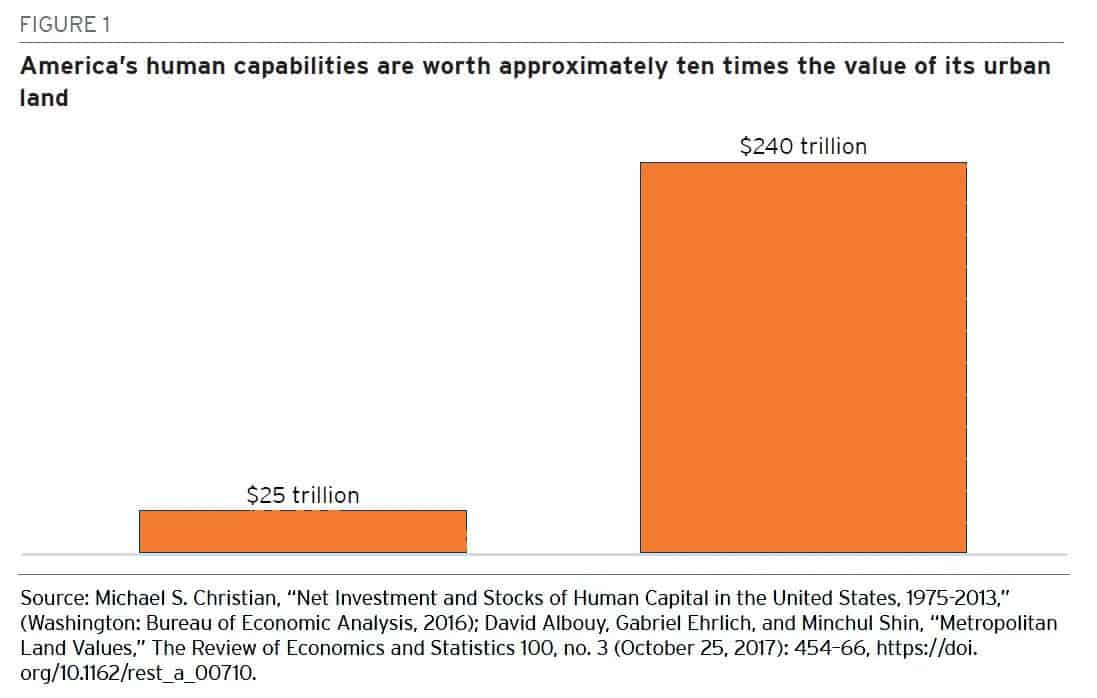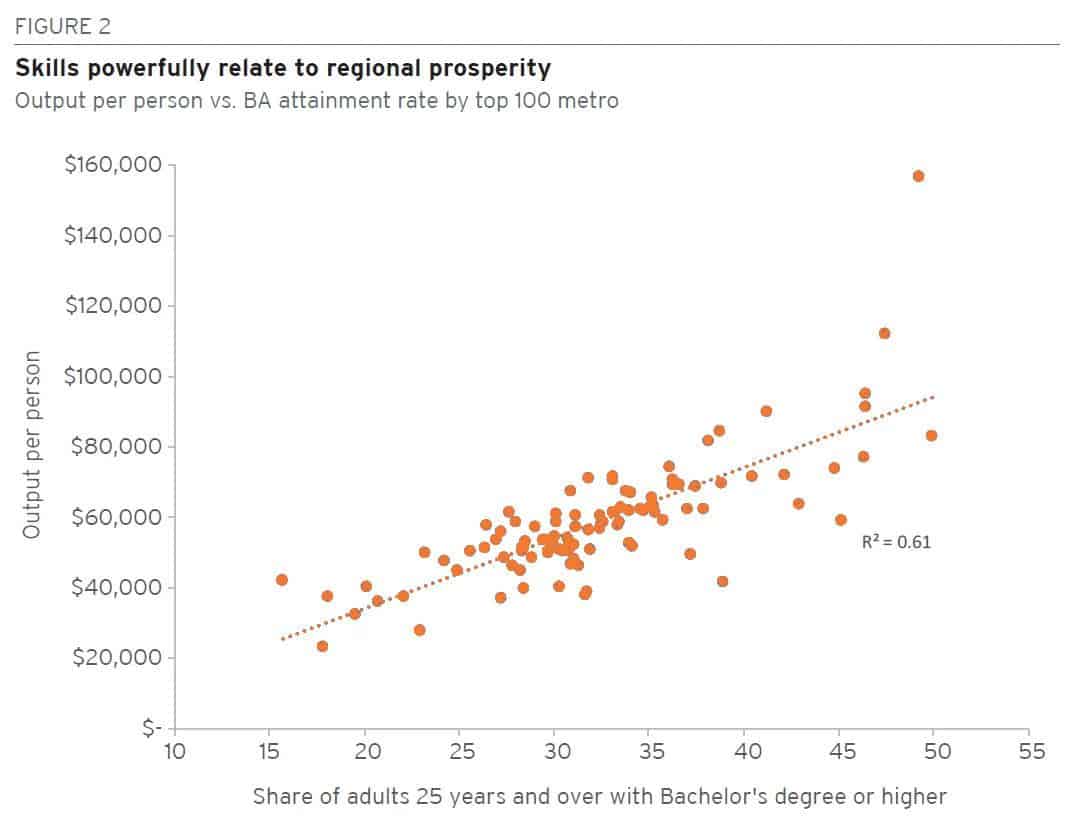
Given this relative value, it’s not surprising that an overwhelming body of evidence concludes that economies grow when they develop and deploy their people in ways that maximize their productive potential.

At its most basic, economic development is human development. It is the nation’s workforce and entrepreneurial ingenuity which generates economic prosperity. This is why the United States invests nearly $1 trillion a year in education. It’s why businesses invest anywhere from $88 billion to $590 billion on training. And it’s why more Americans than ever are seeking education beyond high school.
Yet, for all that investment, something feels very broken about the labor market. Education and training systems are too unequal and unclear, which complicates the journey from school to work for many young Americans. In a brutal twist of irony, most corporate training investment goes to workers that are already highly educated.
These dynamics influence the ability of cities and states to prosper and grow their economies, yet local and state economic development policy is still struggling to address such labor market challenges.
Historically, the job of economic development was to simply focus on jobs, leaving workforce preparation to the education and training system. The reality today is that workforce capabilities are paramount to the core objectives of economic development: business growth and worker prosperity.
Talent matters to business attraction. High-profile economic development competitions such as Amazon’s HQ2 came down to talent, but so do smaller investments beyond technology. Talent matters to business expansion, too. In one survey, four in 10 midsized businesses said they could create more jobs if they had workers to fill them.
In short, businesses cannot grow without a capable workforce, and right now regional economies are undermined by frictions that limit both the development and deployment of workers. Most local and state economic development leaders recognize this and are now ready to evolve their organizations in service of talent development.
How they do this, though, is very important. In the talent space, economic development organizations should focus on leveraging their distinct capabilities: strong economic research, financial resources, and business coordination and recruitment. Our recent report provides many examples of each.
Existing capability: Research
Economic development organizations can raise awareness of key economic challenges and opportunities through rigorous research on regional trends and targeted outreach to business leaders to motivate action.
New application: Generate talent intelligence research products, outreach campaigns, and feedback mechanisms that help employers communicate skills needs and adopt hiring practices that address talent constraints efficiently and equitably.
Existing capability: Resources
Economic development organizaitons, typically city and state economic development departmentws, can deploy financial benefits or customized services to attract, expand, and retain businesses.
New application: Develop talent incentives that utilize public financing and/or technical services to encourage employers to invest in worker skills and productivity.
Existing capability: Relationships
Economic development organizations can co-anchor systemic change by pushing the business community to address major socio-economic challenges.
New application: Support talent systems by helping businesses engage with the education and training system, from middle school through post-secondary education.
At one level, economic development organizations and other employer-facing intermediaries can generate talent intelligence research products, outreach campaigns, and feedback mechanisms that help employers communicate skills needs and adopt hiring practices that address talent constraints efficiently and equitably.
One of the most comprehensive and coordinated local talent intelligence campaigns is Skillful, which combines many of the elements listed above: employer outreach promoting the benefits of skills-based hiring practices, outreach to career coaches enabling them to deploy skills-based practices with job seekers and hiring organizations, and alignment between educational programs and industry employment needs. Skillful has trained 800 businesses in Colorado to date on skills-based hiring practices.
Then, there are talent incentives—these refer to the estimated $50 billion in economic development incentives that local and state governments provide to businesses each year. According to economist Timothy J. Bartik, however, only about 2% of those incentives—or about $1 billion per year—go to talent development.
This is a striking disconnect, for two reasons. First, workforce drives business site selection decisions: 95% of executives rate the availability of skilled labor as “very important” or “important” in their site selection factors. Second, the return on investment from customized job training incentives, as measured by job creation, is about 10 times that of traditional tax incentives.
This is a big opportunity for cities and states, and the Virginia Economic Development Partnership is one example of a state EDO that is deploying its resources in service of talent-driven economic development with the recent launch of the Virginia Talent Accelerator Program. The program will provide customized workforce recruitment and training solutions as a service-based incentive for economic development projects that offer quality jobs.
Finally, economic development organizations can co-anchor talent systems by helping businesses engage with the education and training system, from middle school through postsecondary education. Housed within the San Antonio Economic Development Foundation, SA Works develops career pathways and experiential learning opportunities for San Antonio and Bexar County students and educators, connecting employers with P-12 and postsecondary systems. Since its launch, SA Works has progressively increased the number of students, employers, and teachers served each year: By 2018, more than 4,200 students participated in job shadowing with 145 employers, 899 students interned with 35 employers (directly placed by SA Works), and 275 teachers had externships with 37 employers.
Read any economic development publication and it will become clear that the field has recognized the importance of a skilled workforce. But behavior and institutional change is slow. Talent-driven economic development models exist, but need to be diffused. That is why over the next two months we will be posting a series of blogs from economic development leaders from across the country, starting with Virginia Economic Development Partnership CEO Stephen Moret, that share practical examples of how their organizations are utilizing their research, resources, and relationships to support talent development and deployment.









